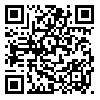Volume 12, Issue 4 (2-2021)
2021, 12(4): 83-89 |
Back to browse issues page
Salar Poorbarat1 

 , Rezvan Rajabzadeh2
, Rezvan Rajabzadeh2 

 , Jamileh Rahimi3
, Jamileh Rahimi3 

 , Hamidreza Mohaddes Hakkak4
, Hamidreza Mohaddes Hakkak4 

 , Reza Gangi5
, Reza Gangi5 

 , Seyed Hamid Hosseini *
, Seyed Hamid Hosseini * 

 6, Mohammad Ahmadpour7
6, Mohammad Ahmadpour7 




 , Rezvan Rajabzadeh2
, Rezvan Rajabzadeh2 

 , Jamileh Rahimi3
, Jamileh Rahimi3 

 , Hamidreza Mohaddes Hakkak4
, Hamidreza Mohaddes Hakkak4 

 , Reza Gangi5
, Reza Gangi5 

 , Seyed Hamid Hosseini *
, Seyed Hamid Hosseini * 

 6, Mohammad Ahmadpour7
6, Mohammad Ahmadpour7 


1- BSC Student in Nursing, Student Research Committee, Bojnurd Faculty of Nursing and Midwifery, North Khorasan University of Medical Sciences, Bojnurd, Iran
2- Department of Epidemiology, School of Public Health North Khorasan University of Medical Sciences, Bojnurd, Iran
3- Department of Epidemiology and Biostatistics, School of Public Health, North Khorasan University of Medical Sciences, Bojnurd, Iran
4- Assistant Professor, Department of Health Education and Health Promotion, School of Health, North Khorasan University of Medical Sciences, Bojnurd, Iran
5- Department of Orthopedic Surgery, School of medicine, North Khorasan University of Medical Sciences, Bojnurd, Iran
6- Department of Public Health, School of Public Health, North Khorasan University of Medical Sciences, Bojnurd, Iran , hosseini.ha60@gmail.com
7- Department of Public Health, Maragheh University of Medical Sciences, Maragheh, Iran
2- Department of Epidemiology, School of Public Health North Khorasan University of Medical Sciences, Bojnurd, Iran
3- Department of Epidemiology and Biostatistics, School of Public Health, North Khorasan University of Medical Sciences, Bojnurd, Iran
4- Assistant Professor, Department of Health Education and Health Promotion, School of Health, North Khorasan University of Medical Sciences, Bojnurd, Iran
5- Department of Orthopedic Surgery, School of medicine, North Khorasan University of Medical Sciences, Bojnurd, Iran
6- Department of Public Health, School of Public Health, North Khorasan University of Medical Sciences, Bojnurd, Iran , hosseini.ha60@gmail.com
7- Department of Public Health, Maragheh University of Medical Sciences, Maragheh, Iran
Abstract: (2495 Views)
Introduction: Test anxiety is one of the most critical concerns of the education system. Spiritual intelligence is a collection of individual capacities about spiritual resources. Due to the importance of spiritual intelligence on test anxiety and students' mutual success and academic achievement, this study aimed to determine the relationship between spiritual intelligence and test anxiety in North Khorasan University of Medical Sciences students.
Methods: The present study is a cross-sectional analytical study investigating the relationship between spiritual intelligence and test anxiety in 435 students of North Khorasan University of Medical Sciences in 2017-18. The subjects were selected by multistage sampling (stratified and systematic random sampling). Data were collected by King's standardized questionnaire of spiritual intelligence and Sarason test anxiety. Data were analyzed by SPSS 20software using t-test, Analysis of variance, and Pearson correlation test.
Results: The subjects' mean age was 21.57 ± 3.57 years, and 308 (70.8%) of the issues were female. The mean score of students' spiritual intelligence was ± 45.82 13.9, and the mean score of exam anxiety was 15.7± 6.07. The results showed a significant and inverse relationship between test anxiety and total spiritual intelligence score. There was a substantial and inverse relationship between spiritual intelligence dimensions, the dimension of critical existential thinking, and personal meaning production with exam anxiety (P-value < 0.001).
Conclusions: According to the results of this study, recognizing the inverse relationship between spiritual intelligence and students 'test anxiety can provide a basis for promoting spiritual intelligence and reducing students' stress.
Methods: The present study is a cross-sectional analytical study investigating the relationship between spiritual intelligence and test anxiety in 435 students of North Khorasan University of Medical Sciences in 2017-18. The subjects were selected by multistage sampling (stratified and systematic random sampling). Data were collected by King's standardized questionnaire of spiritual intelligence and Sarason test anxiety. Data were analyzed by SPSS 20software using t-test, Analysis of variance, and Pearson correlation test.
Results: The subjects' mean age was 21.57 ± 3.57 years, and 308 (70.8%) of the issues were female. The mean score of students' spiritual intelligence was ± 45.82 13.9, and the mean score of exam anxiety was 15.7± 6.07. The results showed a significant and inverse relationship between test anxiety and total spiritual intelligence score. There was a substantial and inverse relationship between spiritual intelligence dimensions, the dimension of critical existential thinking, and personal meaning production with exam anxiety (P-value < 0.001).
Conclusions: According to the results of this study, recognizing the inverse relationship between spiritual intelligence and students 'test anxiety can provide a basis for promoting spiritual intelligence and reducing students' stress.
Type of Study: Orginal Research |
Subject:
Basic Sciences
Received: 2020/04/20 | Accepted: 2020/08/24 | Published: 2021/02/28
Received: 2020/04/20 | Accepted: 2020/08/24 | Published: 2021/02/28
| Rights and permissions | |
 |
This work is licensed under a Creative Commons Attribution-NonCommercial 4.0 International License. |

